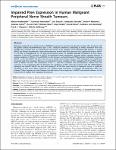Impaired pten expression in human malignant peripheral nerve sheath tumours.
Bradtmöller, Maren
Hartmann, Christian
Zietsch, Jan
Jäschke, Sebastian
Mautner, Victor-F.
Kurtz, Andreas
Park, Su-Jin
Baier, Michael
Harder, Anja
Reuss, David
Deimling, Andreas von
Heppner, Frank L.
Holtkamp, Nikola
Malignant peripheral nerve sheath tumours (MPNST) are aggressive sarcomas that develop in about 10% of patients with the genetic disease neurofibromatosis type 1 (NF1). Molecular alterations contributing to MPNST formation have only partially been resolved. Here we examined the role of Pten, a key regulator of the Pi3k/Akt/mTOR pathway, in human MPNST and benign neurofibromas. Immunohistochemistry showed that Pten expression was significantly lower in MPNST (n = 16) than in neurofibromas (n = 16) and normal nervous tissue. To elucidate potential mechanisms for Pten downregulation or Akt/mTOR activation in MPNST we performed further experiments. Mutation analysis revealed absence of somatic mutations in PTEN (n = 31) and PIK3CA (n = 38). However, we found frequent PTEN promotor methylation in primary MPNST (11/26) and MPNST cell lines (7/8) but not in benign nerve sheath tumours. PTEN methylation was significantly associated with early metastasis. Moreover, we detected an inverse correlation of Pten-regulating miR-21 and Pten protein levels in MPNST cell lines. The examination of NF12/2 and NF1+/+Schwann cells and fibroblasts showed that Pten expression is not regulated by NF1. To determine the significance of Pten status for treatment with the mTOR inhibitor rapamycin we treated 5 MPNST cell lines with rapamycin. All cell lines were sensitive to rapamycin without a significant correlation to Pten levels. When rapamycin was combined with simvastatin a synergistic anti-proliferative effect was achieved. Taken together we show frequent loss/reduction of Pten expression in MPNST and provide evidence for the involvement of multiple Pten regulating mechanisms.
No license information

